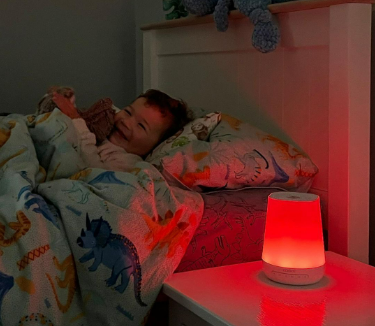18-Month Sleep Regression
- Babee Dreams
- Feb 14, 2023
- 5 min read
Updated: Jun 26, 2025
What is the 18-month regression?
At this point, you could be a pro when it comes to detecting regressions. This particular regression can be tough because toddlers are striving for independence, decision-making, and testing boundaries.
What is a regression?
Sleep regressions occur when there are developmental progressions happening in your baby's life. These regressions coincide with the proper physical, cognitive, and emotional development of your baby.
Why does this sleep regression happen?
The regression you are experiencing with your toddler's sleep can be attributed to their significant mental growth and learning new skills. Two notable developmental changes that could be occurring at this stage are their new sense of independence and their discovery of the word "no". You might find they say no to absolutely everything, and sleep is definitely one of those things they might start objecting to.
They now understand that an action has a reaction. They have now grasped the idea that if they do something or act a certain way, they can influence others and can expect a reaction. Signs of this? ◦ Getting excited when they do something funny and you laugh: This demonstrates your toddler's awareness of their ability to evoke a positive response from you.
◦ Looking upset when they do something naughty and you show a negative response: Your toddler's reaction of appearing upset or sensitive to a negative response indicates their recognition of your disapproval.
So why does sleep become a struggle?
These new skills and observations are a huge accomplishment for your baby, and learning new things can be exhilarating for them. The reason sleep is disrupted during this regression is because they are so excited about their new achievements. These new skills and observations are a huge accomplishment for your baby and the process of learning and discovering new things can be exhilarating for them. Their excitement about their newfound abilities can make it difficult for them to sleep/
How long will this regression last?
Sleep regressions can usually last anywhere between 2-4 weeks. Hang in there! They're going through so much right now, all they need is consistency and the chance to work on these new skills. Remember that it is a temporary phase, and with patience, you can help your child through this challenging time.
Signs of a regression
Fussiness at bedtime
Multiple night wakings
Early rising
Fights naptime
Short naps
Changes in appetite
Clinginess
What else is happening during the 18-month regression?
Running
Climbing
Following simple commands
Imitating things you do
Vocabulary increasing
Teething
Major physical growth spurt
Separation anxiety AGAIN
How to navigate the 18-month sleep regression
Allow for some decision-making
They've probably been able to follow and understand commands for a few weeks or months, but now they expect a reaction from you. They learn about boundaries based on how you react. Continue to let them make simple decisions, and they're most likely now able to verbalise what they want instead of pointing or making noises. You might also find them lingering around, waiting for your reaction when it comes to their decision-making.
Introduce gentle sleep training if needed
They aren't too old to sleep train. They can be somewhat a little more challenging due to their peak in independence and objections, but my resources can most certainly help you through this! My guides have helped toddlers up to the age of two with many successes. If you're seeking help, I have a downloadable sleep guide and optional plans, which can provide the guidance and support needed to establish solid naps and 10-12 hour nights of sleep. To be redirected to the 4-24 month sleep guide and plans, you can click here.
Aim for age-appropriate wake windows and other sleep guides
Around 18 months of age, wake windows typically range from approximately 5-6 hours, with the expectation of having one nap during the day. It is important to ensure that the last nap of the day is capped at 3pm to avoid interfering with bedtime.
If you find it difficult to expand your child's wake windows, taking them outside can be helpful. Sunlight exposure can provide a natural energy boost because sunlight suppresses melatonin production(the sleep hormone). Additionally, the outdoor environment can provide sensory stimulation with its vibrant colours and soothing sounds of nature, helping to keep your little one alert and engaged.
Ensure they consume enough calories during the day
To eliminate hunger as a possible cause of sleep disruptions, it's important to ensure that your baby is consuming feeds regularly. Aim to feed your baby every 2.5 to 3 hours during the day, with a maximum interval of 4 hours between feeds.
Use the day wisely
Taking advantage of the day! Practising any new skills during awake times will make your baby be less likely to be overly excited or stimulated at bedtime. Some things you can do to fill out their wake windows:
Go for a walk outside.
Collect leaves in Autumn or flowers and then glue them on paper to make a book.
Encourage time at a park where they can climb and learn how to play on obstacles.
Play hide-and-seek.
Limit screen time
At this age, some children may start to show interest in electronic devices like iPads or TVs. While these devices can provide entertainment and educational content, it's important to limit their usage and avoid exposing children to screens too close to bedtime. Electronic devices emit blue light, which can suppress the production of melatonin (the sleep homrone) and the exposure to blue light close to bedtime can make it more difficult for children to fall asleep and stay asleep.
Encourage routine
Maintaining a consistent routine for your toddler can provide a sense of stability and control, even as they try to push boundaries during this stage. While it's natural for them to attempt to prolong their bedtime routine or introduce new steps, it's essential to establish some limits if you feel they are intentionally trying to avoid sleep altogether. It's important to strike a balance between meeting their requests and maintaining healthy sleep habits. If you notice their attempts to prolong the bedtime routine, it may be necessary to gently set limits. Clear communication and consistency will help reinforce the boundaries while still allowing for some flexibility within the routine.
Click for tips
At this age, toddlers enjoy having a sense of independence and making choices. Incorporating decision-making opportunities into their daily routine, including bedtime, can help the urge to push boundaries and have a meltdown. When offering choices, it's best to provide limited options, typically two, to prevent overwhelming them. For example, you can present choices like, "Would you like to wear these pajamas or these ones?" By displaying two options. This helps them feel involved in the process.
Consistency
It's crucial to maintain consistency with your child's established routine. Even though regressions can be challenging, it's important to resist the temptation of introducing new habits or making significant changes to their sleep routine. Regressions are temporary phases, but the habits formed during this time can persist.
Do you need help?
Did you know that if your baby has a strong sleep foundation, the chances of sleep being disrupted during developmental changes decrease significantly?
I have the tools and resources to help you. I have guides and optional plans that can give you that one-on-one support you need.

Disclaimer: This blog is for informational purposes only and is not a substitute for professional medical advice. Always consult your healthcare provider for personalised guidance regarding your baby's health and well-being, Babee Dreams does not give medical advice.



